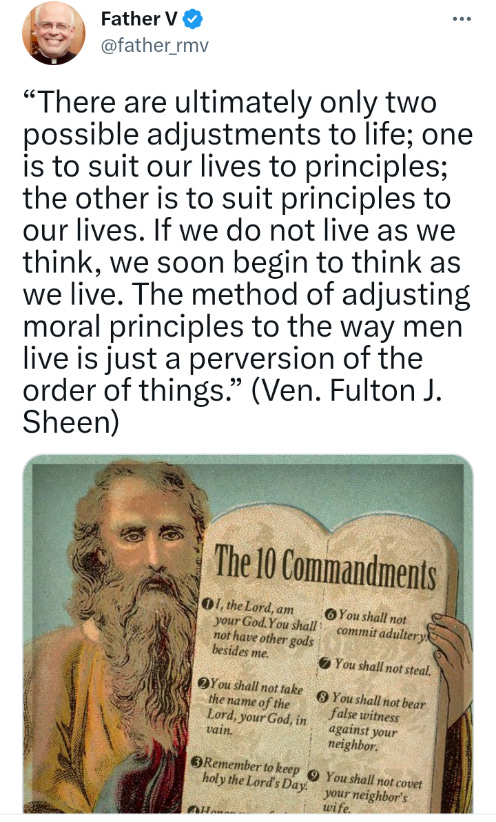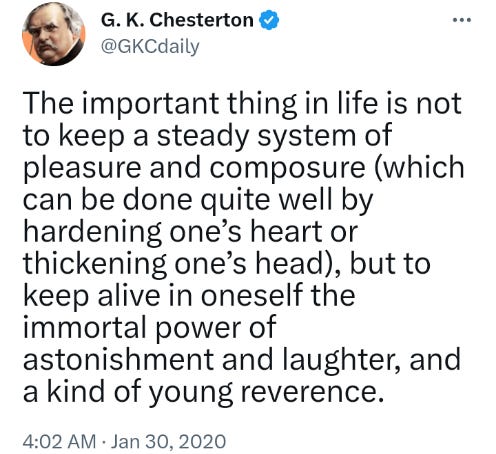I decided that I'm old enough now (37) that I've learned enough life lessons that they're worth being collected and shared with others in a comprehensive way.
I've learned most of these lessons from personal experience, and the rest I've learned from observing other people's words and behaviors. Lessons learned from tweets, articles, books, videos, speeches, etc. will include a reference to the source. I'll begin with the lessons I've learned myself and complete the list with lessons I've learned from others.
I hope this benefits anyone who reads it in some small way, and feedback is welcome.
1. The surest path to perdition is to follow your emotions instead of principles originating from God.
2. a. You are not your opinions, beliefs, knowledge, or emotions. You are your actions. You can have all the correct opinions, beliefs, and knowledge a person can possibly have, and they won't make you a good person or at peace.
Furthermore, acting on the knowledge you already possess is more important than acquiring more knowledge, beyond what is sufficient for action.
b. One of the greatest problems currently is that so many people are convinced that reality is only in their head, and not just in pathological ways.
However, reality is not only in your head. Reality is how the thoughts in your head cause you to interact with the rest of creation, as well as creation itself.
Your thoughts may or may not be a part of reality, but the only way to know is through action - encountering a wide variety of real things and people firsthand, and understanding the feedback you experience.
Jesus said "[d]o not believe me unless I do the works of my Father. But if I do them, even though you do not believe me, believe the works, that you may know and understand that the Father is in me, and I in the Father” (John 10:37-38).
Likewise, “[b]eware of false prophets, who come to you in sheep’s clothing but inwardly are ravenous wolves. You will know them by their fruits. Are grapes gathered from thorns, or figs from thistles? In the same way, every good tree bears good fruit, but the bad tree bears bad fruit” (Matthew 7:15-17).
3. You can't compensate for a lack of character or spiritual development with knowledge or understanding, no matter how hard you try. The harder you try to compensate for your spiritual deficiency, the more aware you'll make yourself of your spiritual deficiency, and the more anxiety it will cause you, until eventually the anxiety becomes so intense that you have to address it.
4. Until we reach spiritual maturity, it's usually for the best that God doesn't give us what we want.
5. The person you are when you're under intense stress, when you're exhausted, or when you're scared is the most authentic version of you, because you lack the energy required for filtering out your unsavory thoughts and pretensions.
You're either the type of person who would repeatedly curse at an elderly person for driving too slow because you have to get somewhere quickly, or the type of person who would offer up that stress to God, or at least accept that such problems are an unavoidable part of life.
If you're the former type of person, it's not sufficient to say "well, I only acted that way because I was under stress!" No, that was an accurate reflection of who you are. Virtue that dissipates as soon as it's put to the test is only imitation virtue.
If I act kind under serene conditions, but unkind under stressful conditions, I can't truly say I'm a kind person.
We can't hide our true self from ourselves and others when we're under stress, and that's why not avoiding it is to our benefit - we're forced to learn about ourselves.
6. a. In a world that facilitates comfort, pleasure, and distraction, encountering reality will usually be uncomfortable or downright painful for most people.
The things that make you the most uncomfortable are the things you need to pay closer attention to, and try to understand better.
b. The more intelligent and/or busy one is, the easier it is for one to rationalize away the more uncomfortable aspects of reality, to one's spiritual detriment.
c. Don't rationalize or distract yourself from things that cause you to suffer. Instead, learn to accept them, and learn the lessons about yourself they offer.
7. A nice guy is a man who is pleasant to interact with, but lacks the ability or courage to draw hard boundaries between himself and his values and the people and values that are incongruent with him and his values.
Women don't respect nice guys because they don't respect a man who they perceive is too weak or timid to protect them from harm. They may like many things about the nice guy, but liking someone doesn't equate to respecting them.
Women intuitively (and in my opinion) sometimes only subconsciously know that if a man is too weak or immature to create hard boundaries for himself, why would he be able to draw hard boundaries between her and the potential threats to her? Such a man is merely a balloon that has the appearance of fullness, but is empty inside, and will either be blown around at the mercy of society's winds, or popped by the first serious threat he faces. Her intuition about this matter is almost always correct.
8. a. As a general rule, permissive women attract weak men, because weak men are too intimidated by women who set firm boundaries to start a relationship with them, and because weak men incorrectly interpret permissiveness by a woman as a signal that the woman desires them.
b. Since relationships with weak men virtually always fail, for most permissive women, this initiates a vicious cycle:
•relationship with weak man fails ➡️
•lowered self esteem due to concluding they're not lovable ➡️
•starts relationship with another weak man in attempt to reclaim lost self esteem and to distract from the pain of the failed relationship with the previous weak man ➡️
•repeat cycle until she learns to believe that her self worth isn't dependent on any man, but originates from her Creator.
9. A requirement for any belief or experience to cause a person to change their thinking and behavior is that it must impact them emotionally. Change never occurs in an intellectual vacuum, disconnected from the emotions, whether on a personal or societal level.
10. Broken attachment patterns explains more of modern society's social ills than most people realize.
11. The majority of disordered behavior in society is due to people refusing to take responsibility for their own thoughts, emotions, and decisions, outsourcing these things to other people, then becoming outraged when those other people inevitably fail to protect them from reality.
12. If you love someone unconditionally, you shouldn't try to control them. Controlling - or trying to control - someone is an indication of possessiveness or covetousness, not love; an indication that you want to vicariously possess something they have or represent, through them. Therefore your affection for the person is based on some aspect of the person or their relationship to you, rather than the person themselves, which is a fundamentally selfish mindset.
13. Don't try to be anyone's savior. Help people whenever possible, but don't think of yourself as someone who's saving them from something bad, and is the 𝘰𝘯𝘭𝘺 person capable of saving them. It's unhealthy for both you and them, because it breeds resentment within the person whose real or perceived need you are trying to satisfy. People with a savior mentality typically behave the way they do as a result of overcompensating for both real and perceived deficiencies; i.e they're very insecure people.
This is a very different type of person than the person who has a big heart and just loves helping people in need of help. The latter type of person will be just as content with someone else helping the person in need as helping them themselves, but the person with a savior mentality wants to be the one to help the needy person 𝘵𝘰 𝘵𝘩𝘦 𝘦𝘹𝘤𝘭𝘶𝘴𝘪𝘰𝘯 𝘰𝘧 𝘦𝘷𝘦𝘳𝘺𝘰𝘯𝘦 𝘦𝘭𝘴𝘦.
14. a. Many qualities make a man masculine, but no quality does more so than self-control.
b. Many qualities make a woman feminine, but no quality does more so than self-control.
c. Many qualities make an adult mature, but no quality does more so than self-control.
d. Self-control is elusive for many, but once acquired, is a superpower more valuable than any material possession, social status, or intellectual mastery.
15. The primary way we change people's hearts and minds is by embodying our beliefs and values, rather than trying to convince people through logic and facts.
16. Unrealistic expectations of others are the most lethal killer of peace, emotional stability, and mental clarity.
17. Anything that can be given easily can be taken away or lost just as easily.
18. In most interactions, people don't care how much you know unless they know how much you care.
19. People who have well developed critical thinking skills, a wide variety of experiences, and a habit of questioning authority, almost always have better judgment on the most important issues than people who have the most formal education or superior technical knowledge.
20. Once you realize that most people's actions are driven by a) a desire to confirm their beliefs, and b) a desire to avoid unpleasant emotions, rather than a desire to pursue truth and virtue, the world makes much more sense, while simultaneously being harder to live in.
21. If you want more out of life, then you must become something more. This necessarily entails sacrificing some degree of comfort and convenience. So, if you're unsatisfied with your life in its present state, you must decide what's more important to you: comfort, or growth. It's impossible to have both simultaneously.
22. Rather than trying to make sense of everything in life on your own, take comfort in knowing that people much wiser than you have already spent many years attempting to make sense of life's big questions.
"The words of the wise are like goads, their collected sayings like firmly embedded nails—given by one shepherd. Be warned, my son, of anything in addition to them.
Of making many books there is no end, and much study wearies the body." - Ecclesiastes 12:11-12
23. There's a time for thinking and a time for acting. Make sure you don't get stuck in "thinking only" mode or "acting only" mode.
24. Virtue can be faked; holiness cannot.
25. Derive your identity from your relationship with God and your decisions, not your innate biological and psychological characteristics, goals, desires, or things that happen to you.
26. We all want to be needed in some way, but chances are the way you're needed is less ostentatious than the way you want to be needed.
27. In an increasingly complex world that's full of misinformation and distractions, conviction and decisiveness are two of the most valuable qualities one can possess.
Without them, you'll just get swept away by the waves of groupthink and propaganda.
28. The simplest act done authentically is more ennobling than the most impressive act done inauthentically.
29. Life is rarely linear. People who expect it to be - for themselves or for others - will cause themselves unnecessary pain and hardship because of that expectation.
30. People will generally respect you for your beliefs to the degree that they cost you something. Saying "I believe X" doesn't mean much if it's just an abstract idea that doesn't cost you anything.
31. There must be one thing you do every day that causes you to say "I have to do this today." If you don't have even one goal or responsibility that you have to do, or at least FEEL like you have to do, your life will feel empty, weightless, and worthless.
32. If morality is only relative as many leftists believe, on what basis can they determine that Putin is wrong to invade Ukraine?
In times of crisis, even people who claim there's no absolute morality act as if there is absolute morality, because natural law applies to everyone.
33. Become comfortable being uncomfortable.
34. Let people do good things for you, even if you don't have a particular need for the thing they do, unless you have a factual reason to believe they have an ulterior motive.
35. The more I learn about the world and human nature, the more I value inductive logic over deductive logic. Despite the fact that it's less certain than deductive logic, it's more suitable to the messy nature of the human and natural worlds.
36. If you try to be everything to everyone, you'll end up being nothing to anyone.
37. The best way to overcome bad memories is to create good memories, or at least engage in activities that give you cause to hope for good memories.
38. When one is socially isolated, all of one's thoughts, emotions, and experiences are viewed in the light of the goal of filling the void of people in one's life. This is the ideal environment for Satan and his demons to operate; Satan's playground.
39. The reason I don't respect most closed-minded people is not just because they're closed-minded; it's because they want you to be closed-minded too.
40. Social media is structured to reward ostentatious behavior. Some people are virtuous enough to resist this built in temptation to act ostentatiously, but many others are too weak to resist it, even after they become aware of it. The degree to which one is susceptible to this temptation is generally equivalent to the degree to which one is unsatisfied with one's life.
41. One of the main reasons people are so resistant to admit they're wrong about a belief, even when it's obvious, is because they've integrated that belief into their identity, so when someone tells them the belief is false, they subconsciously interpret it as an attack on them, rather than a good faith attempt to correct their erroneous thinking.
One way to distinguish a mature person from an immature person is the former can disassociate themselves from a belief they learn is false, while the latter cannot.
42. If you do a good deed for someone and they don't show the amount of gratitude you expected, or if you plan to do a good deed for someone, but learn that they don't need your help, and your main feeling in response is one of disappointment, your motive for helping the person was at least partially impure.
43. Never attempt to go places mentally or emotionally that you can't also go spiritually.
44. Thinking about every evil or deficient thing in the world as a problem to be solved is itself a problem.
45. You can't choose the environment you're planted in. Your only choice is to grow or not to grow in that environment.
46. To activate the creative and critical thinking areas of one's mind, stillness is necessary. The modern world deprives many people of this.
It's no wonder then, that many people become sheep who need to be told what to do and how to do it - they have no original thoughts.
47. Discomfort is at least as good as comfort in facilitating creativity, but it facilitates a different type of creativity than comfort.
48. If you're a man, do something every day that makes you feel like a man. If you're a woman, do something every day that makes you feel like a woman.
49. Not everything you do or think has to be original or impressive. Being content with simple things doesn't make you less of a person.
50. Above a minimum threshold of intelligence, productivity is more dependent on focus and discipline than intelligence.
51. a. A common source of anxiety, depression, and discontent is when people convince themselves they are what they want.
"I want to be liked, respected, desirable to the opposite sex, more intelligent, etc."
These wants are all natural, and sometimes good, but typically they cause us to act in ways that are incongruent with our true nature, which creates a constant inner tension that won't dissipate until we fully accept the limitations of our nature. Attempting to be your true self and something you want that isn't congruent with your true nature simultaneously is like King Solomon's proposal to cut the baby in half so both women claiming ownership of it can be satisfied - it doesn't work.
b. While it's a noble goal to overcome one's limitations, not all of our limitations are meant to be overcome. Consequently, the way we can ascertain whether the limitation we're attempting to overcome is one we're meant to overcome is the presence of the aforementioned inner tension. This is our conscience telling us that we're doing something that we shouldn't be doing.
52. To become spiritually mature, we all must become teachers in addition to being students at some point in our lives. The reason some people struggle with this and remain in an immature state long into adulthood is that being a teacher means teaching truth, which guarantees that some people will dislike you, and some will even attack you.
53. Perhaps the best way to prove to someone you want to have a romantic relationship with that you love them is to become content with yourself before the relationship gets serious. If you aren't content with yourself before the relationship gets serious, you will use the relationship as a means to make yourself content, rather than to love the other person unconditionally. The relationship will be transactional at its core, and thus doomed to failure, like all transactional relationships are.
In many cases, becoming content with yourself will result in losing the attachment to and desire for a relationship with the other person, or you may still desire it, but in both cases, becoming content with yourself is an act of love, because you're sacrificing something you wanted, or still want, thus putting the other person's long term welfare over your short term welfare.
The key question is "how do I know if I'm content with myself?" If your conscience is even just moderately well formed, it will answer this question for you. If you aren't content with yourself, you won't be at peace. You won't be able to enjoy activities and interactions with people for their own merits; rather, you'll always want something more from them that validates you.
Conversely, if you are content with yourself, you will value things, people, and behaviors because they 𝙖𝙧𝙚 good; not because they make you 𝙛𝙚𝙚𝙡 good.
54. You don't know if you love someone or not until they ask you to make a sacrifice for them. If you do it without any conditions or expecting anything in return, you love them. If you refuse to do it, or only offer to do it under optimal conditions, you don't love them. Rather, you love how they - or something about them - make you feel.
55. A woman shouldn't make the man she's in a relationship with feel like he's high on cocaine; she should make him feel like he's going for a walk on the beach. The same is true with the sexes reversed.
56. A big struggle for a lot of people who just experienced a breakup is overcoming the scarcity mindset ("I can never have anything as good as that relationship again"), but the assumption underlying this mindset is almost always false.
57. Often, people just need someone to listen to their problem. They don't need to be told what to do to fix it, because a) they may already know what they need to do to fix it, and b) it may not be a fixable problem.
Giving someone in need your undivided attention should be your first priority; trying to solve their problem should come second (unless it's urgent).
58. Growing up emotionally and spiritually is more difficult than growing up intellectually. It's one thing to learn from experience how human nature and the world operate. It's another thing to accept that knowledge on an emotional/spiritual level when it causes you suffering.
59. One of the most obvious red flags indicating that the claims/arguments made in a book/article are false is the frequent use of hyperbolic or excessively poignant language, and liberal use of adjectives.
There's no quantitative way to prove this inference; it's just something you recognize instantly after you've seen it enough times.
60. If you want to know the truth about anything important, you're going to have to dig, which means you're going to have to get your hands dirty.
People who believe they and their beliefs are too pure to be sullied by a messy and tedious search will never know the fullness of truth.
61. People who desire truth strongly enough will find ways to attain it, no matter how uncomfortable it makes them feel.
People who give a higher priority to things other than truth - avoidance of discomfort, social status, safety, etc - will find ways to attain those things also.
62.When someone assigns you a label that's intended to stigmatize you, that's a strong indicator that your claim is true.
The goal of any stigmatizing label is to punish people for speaking truth.
Falsehoods don't require stigmatization, because they can be refuted; truths cannot.
63. "Spirit precedes reason -- we are primarily social and not rational creatures...So what's most important is getting our relationships right. Truth does not have the power to engender love, but love has the power to engender truth."
- Rene Girard
Source: https://twitter.com/robkhenderson/status/1618716198740590593
64.
65.
66. “Above all, don't lie to yourself. The man who lies to himself and listens to his own lie comes to a point that he cannot distinguish the truth within him, or around him, and so loses all respect for himself and for others. And having no respect he ceases to love.”
- Fyodor Dostoevsky, The Brothers Karamazov
67.
68. "People organize their brains with conversation. If they don't have anyone to tell their story to, they lose their minds. Like hoarders, they cannot unclutter themselves."
- Dr. Jordan Peterson
69. "Don’t forget in the darkness what you learned in the light."
- Joseph Bayly
“No government at any level, or at any price, can afford, on the crime side, the police necessary to assure our safety unless the overwhelming majority of us are guided by an inner, personal code of morality. And you will not get that inner, personal code of morality unless children are brought up in a family—a family that gives them the affection they seek, that makes them feel they belong, that guides them to the future, and that will build continuity in future generations….Indeed, I would say, the greatest inequality today is not inequality of wealth or income. It is the inequality between the child brought up in a loving, supportive family and one who has been denied that birthright.”
-Margaret Thatcher
Source: http://wjmi.blogspot.com/2016/07/the-moral-challenges-for-21st-century.html?m=1
Source: https://twitter.com/JanJekielek/status/1495922272732950530
74. "Having sex with someone to fill a psychological void, so you can feel like you matter to them and are valued by them for a few moments is a very disempowered choice from the genesis.
Anything built on the foundation of a disempowered choice will simply be an extension of disempowerment."
- JP Sears
Source: https://m.youtube.com/watch?v=RLZgPjrXU54&pp=ygUSSnAgc2VhcnMgYWJvcnRpb24g
75. "If I have ventured wrongly, well, then life helps me by punishing me. But if I have not ventured at all, who helps me then?”
- Soren Kierkegaard
Source: https://twitter.com/Andrewnsnyder/status/1552849418822602752?s=20
76.
77.
Source: https://substack.com/profile/137496118-catholic-adventurer/note/c-16369167?utm_source=notes-share-action
78. "It's like, here you are, suffering away. What makes it worthwhile?
Responsibility - that's what gives life meaning. It's like, lift a load. Then you can tolerate yourself, right? Pick something up and carry it.
Pick something up and carry it. Make it heavy enough so you can think 'yeah, well, useless as I am, at least I can move that from there to there.'
What's really cool about that is that when I talk to these crowds about that, the mens' eyes light up.
Women know what they have to do. Men have to figure out what they have to do, and if they have nothing worth living for, then they stay Peter Pan, and why the hell not, because the alternative to valued responsibility is impulsive, low class pleasure.
Responsibility, man. That's where the meaning in life is."
- Dr. Jordan Peterson
Source: https://m.youtube.com/watch?v=NX2ep5fCJZ8&feature=youtu.be
79. "I will add, that the man who never looks into a newspaper is better informed than he who reads them; inasmuch as he who knows nothing is nearer the truth than he whose mind is filled with falsehoods and errors."
- Thomas Jefferson
Source: https://press-pubs.uchicago.edu/founders/documents/amendI_speechs29.html
80.
81.
82.
83. "The person who tries to break the natural and moral law will break himself over it or be broken by it."
- C.S. Lewis
84. "We cannot stand on the shoulders of our forefathers like we can with science and technology. Each child born must fight the moral battle between good and evil anew."
- David Larson
Source: https://www.crisismagazine.com/opinion/the-evangelical-sex-abuse-moment
85.
86.
87.
88.
89.
90.
91.
92. “Again, the new oligarchy must more and more base its claim to plan us on its claim to knowledge. If we are to be mothered, mother must know best. This means they must increasingly rely on the advice of scientists, till in the end the politicians proper become merely the scientists' puppets. Technocracy is the form to which a planned society must tend. Now I dread specialists in power because they are specialists speaking outside their special subjects. Let scientists tell us about sciences. But government involves questions about the good for man, and justice, and what things are worth having at what price; and on these a scientific training gives a man's opinion no added value. Let the doctor tell me I shall die unless I do so-and-so; but whether life is worth having on those terms is no more a question for him than for any other man.”
-C.S. Lewis, Willing Slaves Of The Welfare State
Source: http://liberty-tree.ca/research/willing_slaves_of_the_welfare_state
94.
“All of humanity's problems stem from man's inability to sit quietly in a room alone.”
-Blaise Pascal
If you made it to the end of this list, God bless you 😁






























There is so much wisdom in this article. Thank you so much for sharing, I really enjoyed reading this.
This is a wonderful font of wisdom and lessons to learn.